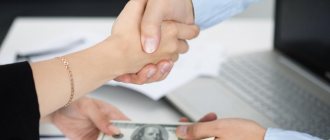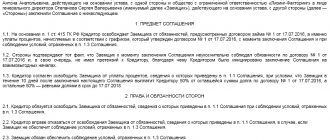Regulations on cash payments
Uniform requirements for cash payments are established by Bank of Russia Directive No. 5348-U dated December 9, 2019 (registered with the Russian Ministry of Justice No. 57999 on April 7, 2020).
The standard provides for a number of restrictions and conditions that must be met in order to spend cash at the organization's cash desk - its norms determine the maximum amount of cash payments between legal entities and individual entrepreneurs. The key requirement relates to the expenditure of proceeds received as payment for products sold, work performed and services rendered. In 2022, it is prohibited to spend cash proceeds for any purpose, except for the following:
- wages and social benefits to employees;
- personal needs of a businessman (IP);
- payment for goods, works, services, except for securities;
- refund of payment for goods, work, services;
- the issuance of money will be accountable;
- operations of bank payment agents, subagents;
- insurance compensation under insurance contracts with individuals.
For example, in order to issue a loan to a third party, you will first have to hand over the cash proceeds to the bank. Then submit an application to the bank to receive cash. Capitalize the money in the cash register, and only then transfer the funds as a loan to a third party.
Forms of non-cash payments
It is possible to settle both directly between the parties to a compensated property relationship, and through an additional entity – a credit institution. The requirements for non-cash financial transactions are contained in norms developed in various branches of law, mainly financial and civil, together representing a comprehensive institution of law.
Non-cash payments are regulated mainly by the following documents: the Civil Code of the Russian Federation (Articles 861–885), the federal laws “On the Central Bank of the Russian Federation (Bank of Russia)”, “On Banks and Banking Activities”. Also, this area of public relations is regulated by regulations of the President and the Government of the Russian Federation, and regulations of the Bank of Russia.
There are various non-cash forms of cash payments in which it is possible to use:
- payment orders;
- letter of credit;
- collection orders or collections;
- check books;
- plastic cards;
- transfer of electronic money.
Next, we’ll talk about each form of non-cash payments in more detail.
Carrying out transactions based on a payment order
This form involves creating a payment order. In it, the payer instructs the banking organization to transfer a certain amount from his account.
A payment order is a kind of payment instruction, according to which the bank transfers the amount indicated in it to an account in the recipient bank belonging to the person specified in the order.
In this case, the parties to the compensated property relationship are the payer and the recipient of funds; The banking organization is the participant that makes the payment.
In addition to the person to whom the transfer is intended, the payment order indicates the timing of the transfer of money.
The payment order is valid for 10 days, and the day on which it was drawn up is not included in this period.
Limit for 2022
The legislation sets a limit on cash transactions only in relation to organizations. For example, payment of services in cash by a legal entity to an individual is not limited to a maximum limit. But we are talking about ordinary citizens who are not registered as entrepreneurs with the Federal Tax Service. If payment is made between companies, firms or registered entrepreneurs, then the limit established in clauses 2, 6 of Bank of Russia Instructions No. 5348-U applies, as for settlements between legal entities.
The current limit for cash payments under one agreement between legal entities is 100,000 rubles under one agreement, regardless of whether the company receives the payment or makes it. The following conditions do not matter:
| Condition | A comment |
| Type and subject of the agreement | The limit of 100,000 applies to all cash payments, regardless of the subject of the contract. For example, a company does not have the right to issue a cash loan under one agreement for more than 100,000 rubles. It is also impossible to pay for goods, work, or services under one contract in an amount exceeding the current limit of 100,000 rubles. |
| Contract term, frequency and number of payments | It is prohibited to pay for a contract in cash, even if the amount is divided into several tranches, for a long time and if one payment does not exceed the permissible limit for settlements between legal entities in cash. For example, a company entered into an agreement for the supply of products worth 500,000 rubles. You cannot split the payment into 10 parts of 50,000 each and pay the amount in cash. It has been established what the maximum amount in cash an institution has the right to pay to a counterparty organization under a supply agreement is 100,000 rubles, the rest is transferred by bank transfer (by payment order). It is not prohibited to make multiple cash payments on the same day if payment is made under different agreements. Let's say a company pays for services under three different contracts. The limit is calculated for each contract - 100,000 rubles. |
| Type of obligations | We are talking about penalties, fines and other sanctions that are provided for by the terms of the contract. You cannot pay penalties in cash if the contract limit of 100,000 rubles has already been exhausted. |
| Type of contract execution | There are several ways to complete a transaction. For example, by drawing up a single document, exchanging forms, an offer agreement, etc. The limit of 100,000 applies to all types of transactions between individual entrepreneurs and legal entities and making payments between companies in cash. It is prohibited to pay an invoice whose amount exceeds RUB 100,000. |
| Calculation method | These payments between organizations for cash are carried out in two ways:
The current limit on cash payments between an LLC and an individual entrepreneur under one agreement applies regardless of the chosen method. Please note that the restriction does not apply to the payment of travel expenses to an accountable person. |
Cash payments between legal entities and individuals
As already noted, the established cash settlement limit does not apply to transactions carried out between an enterprise (or individual entrepreneur) and an individual. This directly concerns settlements with customers and clients, i.e. they can purchase a product or service for cash for an amount not limited by law.
In addition, the limit is not taken into account in some situations (for example, payment of customs duties) or in intra-company transactions involving the receipt of the following cash by employees:
- money for a report or for a business trip;
- wages, social benefits, payments under insurance contracts;
- loans.
The issuance of cash for these purposes is not limited by law, but is controlled by the company, and it should be borne in mind that maximum limits are set for travel funds (daily allowances) that are not subject to personal income tax.
Example
An employee of Astra LLC received travel allowances in the amount of 200,000 rubles. RUB 60,000 was used directly for travel expenses. (accommodation, daily allowance), and for 140,000 rubles. an employee (on behalf of the company) concluded and paid in cash an agreement with a counterparty organization. There is a violation of the law that can entail significant fines for exceeding cash payments between legal entities: from an enterprise from 40,000 to 50,000 rubles, from officials from 4,000 to 5,000 rubles. (Part 1 of Article 15.1 of the Code of Administrative Offenses of the Russian Federation).
Which participants are subject to the limit?
The maximum limit for cash payments applies to the following economic entities:
- transactions between legal entities. For example, these are settlements between organizations, when one legal entity pays or receives money from another legal entity. In this case, all cash payments between legal entities are made within 100 thousand rubles, regardless of the total amount of the transaction;
- transactions between individual entrepreneurs and legal entities. For example, a company has entered into an agreement with an entrepreneur. Within the framework of one agreement, it is allowed to make payments up to 100,000 rubles through the cash desk or an accountable person;
- transactions between entrepreneurs. For example, when one businessman pays or receives payment under a contract from another businessman. Please note that the maximum amount of cash payments between legal entities applies only if both merchants are registered as individual entrepreneurs;
- issuing money to an accountable person to pay for goods, works and services. In this case, observe the established limit of 100,000 rubles. If money is issued on account to pay for travel expenses, then the restrictions do not apply.
If transactions are made between ordinary citizens (without registration with the Federal Tax Service as an individual entrepreneur), then the restrictions described above on cash payments between legal entities do not apply. Do not take the limit into account when issuing funds to employees and other individuals. For example, if a company issues a loan to an individual, then the 100,000 limit does not apply.
Ban on cash payments in Russia under Law No. 44-FZ
Let us turn to the text of Art. 34 of the Law “On the contract system in the field...” of 04/05/2013 No. 44-FZ (hereinafter referred to as Law No. 44-FZ), which determines the contract price. It does not say that payments in cash within the framework of these legal relations are prohibited.
Moreover, paragraph 15 of Art. 34 provides that the requirements for a fixed price and the form of the agreement may not apply if, for example, it is an agreement with a single supplier. Based on this, we can conclude that cash payments with a single supplier can be used in 2 cases:
- When concluding a contract, the amount of which does not exceed 100,000 rubles. (Clause 4, Part 1, Article 93 of Law No. 44-FZ).
- When signing an agreement, the amount of which does not exceed 400,000 rubles, for some organizations in accordance with clause 5 of part 1 of art. 93 of Law No. 44-FZ (for example, physical education and sports).
In all other cases, cash payments are not allowed.
When payments are made without restrictions
As part of the instructions of the Central Bank of the Russian Federation, cash payments between legal entities are limited to a maximum amount of 100,000 rubles per agreement. But there are a number of exceptions where the established limit does not apply. These include:
- payment of wages, incentives and compensation bonuses in favor of employees;
- issuance of social payments in favor of employees;
- issuing cash to the employee for reporting;
- issuing money to an entrepreneur for personal purposes not related to running a business.
Perform other operations on cash transactions taking into account the current limit on the amount of cash payments between organizations and entrepreneurs in 2022 - 100,000 rubles.
You might also be interested in:
Online cash registers Atol Sigma - how to earn more
How to make a return to a buyer at an online checkout: step-by-step instructions
MTS cash desk: review of online cash register models
Scanners for product labeling
Shoe marking for retail 2022
Online cash register for dummies
Did you like the article? Share it on social networks.
Add a comment Cancel reply
Also read:
Who can work without an online cash register?
Can individual entrepreneurs operate without an online cash register in 2022?
Which entrepreneurs were given a temporary deferment and which were given a permanent deferment? Which businessmen have benefits, and how to get them? These questions concern many entrepreneurs. At the moment, the vast majority of enterprises have already switched to using cash register equipment when selling goods and services, since, according to Federal Law, almost all categories of business are obliged... 661 Find out more
The complaint book has been cancelled: handling complaints in 2022
The complaint book has been canceled since the beginning of 2022.
Already on January 1, changes to the rules of retail sales began to take effect. One of the innovations was the abolition of the book of complaints and suggestions for consumers. From now on, retail outlets are not required to have a complaint book. Accordingly, the presentation of this book at the request of the client now remains at the discretion of the owner. However, the legislation does not propose a similar replacement for the complaint book... 331 Find out more
How and who to keep a cash book in 2022
The cash book in 2022, as before, is drawn up by business owners who have cash turnover.
Moreover, it is carried out alone, even when using several types of activities and different tax regimes. Let's consider how to correctly fill out the cash book in 2022 and what data is reflected in it. Accounting for the simplified tax system Comprehensive accounting for the simplified tax system Turnkey income for small and medium-sized businesses... 731 Find out more



